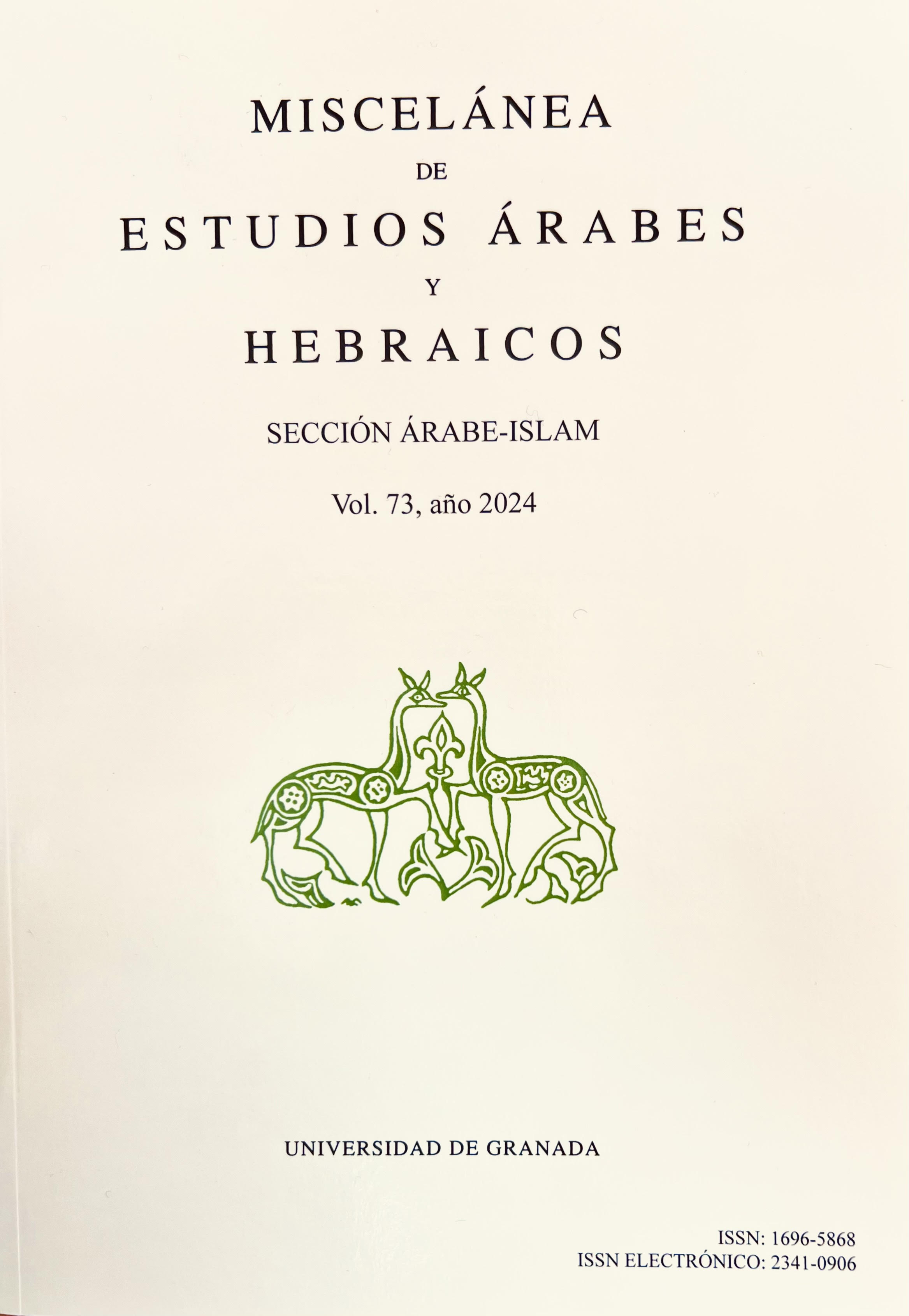Abū Ḫayyān al-Tawḫīdī’s Gnoseology: A Study of “al-Laylà l-khāmisa wa-l-thalāthūn” of al-Imtā‘ wa-l-mu’ānasa
DOI:
https://doi.org/10.30827/meaharabe.v73.27888Palabras clave:
Abū Ḥayyān al-Tawḥīdī. Gnoseología. Filosofía árabe. Filosofía islámica. Teoría del conocimientoResumen
Hasta ahora, los aspectos de la gnoseología expuestos por Abū Ḥayyān al-Tawḥīdī en “al-Laylà l-jāmisa wa-l-ṯalāṯūn” de su libro al-Imtā‘ wa-l-mu’ānasa no han sido estudiados. La gnoseología de al-Tawḥīdī es digna de consideración por su valor intrínseco y el esclarecimiento que ofrece para reconstruir y sistematizar la evolución del pensamiento en la civilización islámica. Este estudio adopta una metodología hermenéutica, aunque a la luz de las influencias a las que el pensamiento de al-Tawḥīdī pudiera haber estado expuesto con mayor probabilidad. Primeramente, el estudio contextualiza brevemente la relevancia de la gnoseología en el ámbito filosófico y social, y evalúa la relevancia de al-Tawḥīdī y su obra en la filosofía de la civilización islámica. Las principales tesis defendidas por al-Tawḥīdī son: la imposibilidad de que el conocimiento se comprenda a sí mismo, el origen divino del ‘aql y del nafs, y la inmortalidad del nafs. Sin embargo, existen aspectos difusos: la exacta correlación entre el nafs y el ‘aql en sus respectivas funciones y la inmortalidad del ‘aql tras la muerte.
Descargas
Citas
BERGÉ, Marc. “Genèse et fortune du Kitāb al-Imtā‘ wa -l-mu’ānasa: d’Abū Ḥayyān al-Tawḥīdī (m. en 414/1023)”. Bulletin d’Études Orientales, 25 (1972), pp. 241-277, 279-283, 285-298, 300.
—. “Les écrits d’Abū Ḥayyān al-Tawḥīdī: Problèmes de chronologie”, Bulletin d’Études Orientales, 29 (1977), pp. 53-63.
CASSARINO, Mirella. “Parolle della Notte: intessere i saperi nella dimora del Visìr”. Quaderni di Studi Arabi, Nuova Serie, 3 (2008), pp. 97-120.
HAMDANI, Abbas. “Abū Ḥayyān al-Tawḥīdī and the Brethren of Purity”, Inter- national Journal of Middle East Studies, 9, 3 (1978), pp. 345-353.
HODGSON, Marshall G.S. The Venture of Islam. Chicago: The University of Chicago Press, 1974.
IKHWĀN AL-ṢAFĀ’. “Faṣl fī faḍīla jawhar al-nafs”. Rasā’il Ikhwān al-Ṣafā’. Beirut: Dār Ṣādir, 1957, vol. II, pp. 461-463.
—. “Al-Risāla al-Rābi‘a min al-nafsāniyyāt al-‘aqliyyāt”. Rasā’il Ikhwān al- Ṣafā’. Beirut: Dār Ṣādir, 1957, vol. III, p. 232.
—. “Faṣl fī ta‘dād quwà l-nafs”. Rasā’il Ikhwān al-Ṣafā’. Beirut: Dār Ṣādir, 1957, vol. III, pp. 488-472.
KENANAH, Faisal. “La conception de l’âme chez Abū Ḥayyān al-Tawḥīdī. L’exemple du Kitāb al-Imtāʿ wa’l-Muʾānasa”. Journal of Arabic and Islamic Studies, 19 (2019), pp. 35-56.
KEY, Alexander. “The Applicability of the Term “Humanism” to Abū Ḥayyān al-Tawḥīdī”. Studia Islamica, 100/101 (2005), pp. 71-112.
MAS‘ŪD, Labiūḍ. “Fī mawqif min al-manāhiŷ al-kalāmiyya bayna risālatay Iḥṣā’ al-‘Ulūm” wa-Ṯamrāt al-‘Ulūm” li-l-Tawḥīdī”. Al-Akādīmīa li-l-Dirāsāt al-Iŷtimā‘iyya wa-l-Insāniyya, Qism al-Ādāb wa-l-Falsafa, 17 (2017), pp. 3-7.
NETTON, Ian Richard. Al-Fārābī and his school. London–New York: Routled- ge, 1992, pp. 8-80.
REYMOND, Pierre-Louis. “L’intellectuel, le langage et le pouvoir, ou l’humanisme d Abū Ḥayyān at-Tawḥīdī: lecture d’une nuit du Kitāb al-Imtā‘ wa-l-Mu’ānasa”. Bulletin d’Études Orientales, 58 (2006-2007), pp. 77-106.
STERN, S.M. “Abū Ḥayyān al-Tawḥīdī”. In Encyclopaedia of Islam. Second Edition. Edited by P. Bearman; Th. Bianquis; C.E. Bosworth; E. van Donzel, and W.P. Heinrichs.
AL-TAWḪĪDĪ, Abū Ḫayyān. Kitāb al-Imtā‘ wa-l-Mu’ānasa”. Ed. ‘Abd al- Raḥmān al-Muṣṭāwī. Beirut: Dār Iḥyā’ al-Turāṯ al-‘Arabī, 2010.
Descargas
Publicado
Cómo citar
Número
Sección
Licencia
Derechos de autor 2024 Javier Hernández Manrique

Esta obra está bajo una licencia internacional Creative Commons Atribución 4.0.
Los autores que publican en esta revista están de acuerdo con los siguientes términos:
1. Los autores conservan los derechos de autor y garantizan a la revista el derecho de ser la primera publicación del trabajo al igual que licenciado bajo una Creative Commons Attribution License que permite a otros compartir el trabajo con un reconocimiento de la autoría del trabajo y la publicación inicial en esta revista.
2. Los autores pueden establecer por separado acuerdos adicionales para la distribución no exclusiva de la versión de la obra publicada en la revista (por ejemplo, situarlo en un repositorio institucional o publicarlo en un libro), con un reconocimiento de su publicación inicial en esta revista.
3. Se permite y se anima a los autores a difundir electrónicamente (por ejemplo, en repositorios institucionales o en su propio sitio web) la versión publicada de sus trabajos (versión post-print del editor) o, en su defecto, el de la versión post-print del autor ya evaluada y aceptada. Esto puede dar lugar a intercambios productivos, así como a una citación más temprana y mayor de los trabajos publicados (Véase The Effect of Open Access).
4. La revista no se hace responsable de las opiniones vertidas por los autores.















